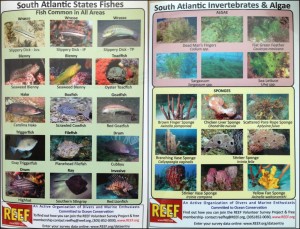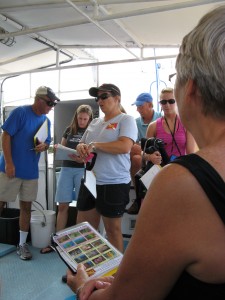
On August 13 -14, SCUBA divers, historians, and scientists gathered at the North Carolina Aquarium in Pine Knoll Shores, NC to learn how to identify fish, algae, and invertebrates common to the coastal waters of the South Atlantic states. The workshop was part of NOAA’s ‘Bringing Shipwrecks to Life’ program, which is designed to connect local communities to marine science and support local economies in North Carolina by promoting new ways to study and enjoy historical resources. The Office of National Marine Sanctuaries (ONMS) and the Monitor National Marine Sanctuary hosted the event with support of NCCOS scientists topromote the use of NOAA-funded Reef Environmental Education Foundation (REEF) identification cards. The new materials were developed by ONMS using NCCOS data and expertise.

REEF education specialists led the training on how to use the ID cards and conduct surveys to report informationon fish and invertebrate populations. Event participants then put their skills to work during a SCUBA dive conducting biological surveys on a nearshore shipwreck.
The survey techniques taught during this event can be used by attendees to teach others or to continue to conduct surveys independently. Once divers gather their data they can then enter it into the global REEF database that is useful to resource managers, scientists, and recreational divers. For more information contact: Christine Buckel ( Christine.Addison@noaa.gov ) or Jenny Vander Pluym ( Jenny.VanderPluym@noaa.gov ).
